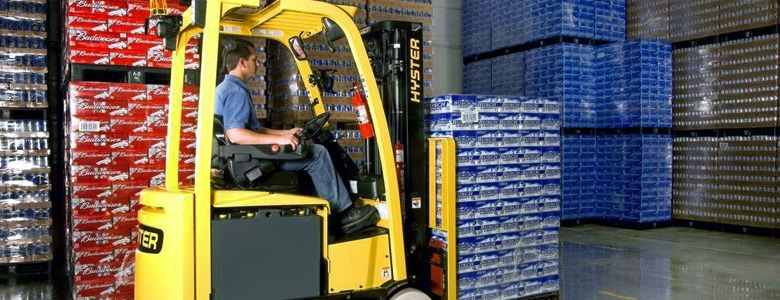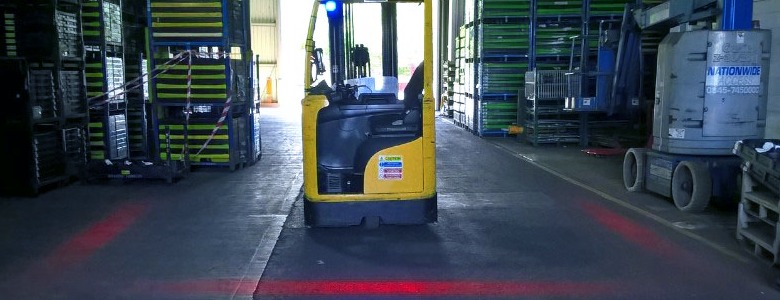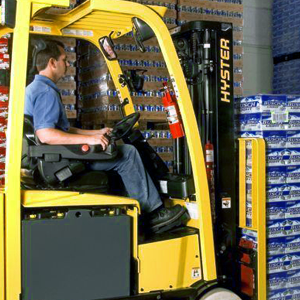Driving a forklift not only takes skill, it requires concentration and awareness. As any experienced forklift operator can tell you, running a forklift without the correct training could be incredibly dangerous. According to figures released by the Forklift Truck Association, 5 people suffer life changing injuries every working day, due to forklift accidents. To help keep your operators, staff and the public safe, we’ve put together some useful forklift safety suggestions.

Tip 1) Ensure Operators Receive Refresher Training
It may have been years since your operators had their original forklift training and received certification. Frequent updates to the rules and regulations surrounding the operation of heavy machinery, may mean that your operators could be out of touch.
By putting your operators through refresher courses (it’s recommended that this is done every four years) they can fill any gaps in their skill set and knowledge. It also ensures that they have forklift safety at the forefront of their minds.
If you’d like to know more about what training is available, why not get in touch with our experienced team? You can get in touch by calling 01933 228127, or by emailing info@askhitec.co.uk.
Tip 2) Make Sure Loads Are Tightly Secured
Awkward loads can be particularly troublesome. This is especially the case when your operators are trying to work quickly. However it’s vital to ensure that all loads are properly secured. This not only improves the control that your operators have, but it greatly reduces the risk of collapses, breakage of goods, damage to your facility and the harming of pedestrians.
Also, it’s important to check the condition of your pallets, if they’re poor, they could break under the weight of your load.
Tip 3)Frequent Inspections
Drivers should always perform safety checks before each shift use of all machines. Not only does this help spot any issues (which should be reported immediately and the machine should remain unused until fixed), but it can help prevent any dangerous accidents caused by the forklift malfunctioning. It can also prevent the need for expensive repairs at a later date.
Issues to act on include: smoke, unusual smells or noises, any leaks, broken or loose hoses/wires and problems with tyres.
Tip 4) Visibility Is Key
Not only is it important that your forklift operators can see what they’re doing, but it’s also vital that they can be seen doing it. Forklift operator awareness is integral to the job, whether it’s negotiating through narrow aisles and racking, moving around a yard, carrying a large load through a warehouse or clearing a parking area of snow.
Overhangs, items left on the floor, doorways and pedestrian walkways are all potential hazards, especially when carrying a load which restricts vision. Driving backward can be an easier method of travelling when this is the case. Having a tidy facility can help operators avoid potential dangers, as well as having clearly marked walkways.
Ensuring that your forklifts can be seen may seem obvious, but low visibility (such as early or late hours, poor weather, or crowded areas) can not only affect your operators’ judgement, but can endanger those around them. Making sure your forklifts have strong, working lights is vital. There are also additional technologies available to improve truck visibility and safety, including one which can cast light beams to show the unsafe space around a forklift.

Tip 5) Maintain Forklift Safety Practice
Confident forklift operators can occasionally become complacent, whether it’s driving their machine too fast to get a job done quicker, hopping onto their forklift without completing safety checks, driving with their forks too high or lifting loads too big for their machine.
To help ensure that forklift safety practice is followed, it’s important to regularly remind operators of regulation, whether that’s through weekly safety meetings, refresher training or by enforcement with repeat offenders.
—-
We hope this short guide has been helpful for you. If you have any questions, or would like to know more, why not get in touch with our experienced team? They’ll be able to provide you with additional helpful advice, as well as organise any training your operators may need. You can reach us at 01933 228127, or by emailing us at info@askhitec.co.uk.
If you want to keep up to date with the latest developments in the forklift industry and the biggest news in Hitec, why not subscribe to our quarterly newsletter?

